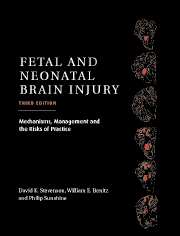Book contents
- Frontmatter
- Contents
- List of contributors
- Foreword
- Preface
- Part I Epidemiology, Pathophysiology, and Pathogenesis of Fetal and Neonatal Brain Injury
- Part II Pregnancy, Labor, and Delivery Complications Causing Brain Injury
- 9 Maternal diseases that affect fetal development
- 10 Antepartum evaluation of fetal well-being
- 11 Intrapartum evaluation of the fetus
- 12 Obstetrical conditions and practices that affect the fetus and newborn
- 13 Fetal and neonatal injury as a consequence of maternal substance abuse
- 14 Chorioamnionitis and its possible relation to subsequent cerebral palsy
- 15 Bacterial sepsis in the neonate
- 16 Neonatal bacterial meningitis
- 17 Neurological sequelae of congenital perinatal infection
- 18 Perinatal human immunodeficiency virus infection
- 19 Inborn errors of metabolism with features of hypoxic–ischemic encephalopathy
- Part III Diagnosis of the Infant with Asphyxia
- Part IV Specific Conditions Associated with Fetal and Neonatal Brain Injury
- Part V Management of the Depressed or Neurologically Dysfunctional Neonate
- Part VI Assessing the Outcome of the Asphyxiated Infant
- Index
- Plate section
9 - Maternal diseases that affect fetal development
from Part II - Pregnancy, Labor, and Delivery Complications Causing Brain Injury
Published online by Cambridge University Press: 10 November 2010
- Frontmatter
- Contents
- List of contributors
- Foreword
- Preface
- Part I Epidemiology, Pathophysiology, and Pathogenesis of Fetal and Neonatal Brain Injury
- Part II Pregnancy, Labor, and Delivery Complications Causing Brain Injury
- 9 Maternal diseases that affect fetal development
- 10 Antepartum evaluation of fetal well-being
- 11 Intrapartum evaluation of the fetus
- 12 Obstetrical conditions and practices that affect the fetus and newborn
- 13 Fetal and neonatal injury as a consequence of maternal substance abuse
- 14 Chorioamnionitis and its possible relation to subsequent cerebral palsy
- 15 Bacterial sepsis in the neonate
- 16 Neonatal bacterial meningitis
- 17 Neurological sequelae of congenital perinatal infection
- 18 Perinatal human immunodeficiency virus infection
- 19 Inborn errors of metabolism with features of hypoxic–ischemic encephalopathy
- Part III Diagnosis of the Infant with Asphyxia
- Part IV Specific Conditions Associated with Fetal and Neonatal Brain Injury
- Part V Management of the Depressed or Neurologically Dysfunctional Neonate
- Part VI Assessing the Outcome of the Asphyxiated Infant
- Index
- Plate section
Summary
Introduction
Fetal development is affected by intrinsic (genetic) and environmental (intrauterine) factors. Studies at the molecular level as well as at the epidemiologic level are helpful in determining possible etiologies of diseases that affect not only the developing fetus but also the growing and adult human organism. Complex diseases once thought to be mainly “adult” in onset, such as hypertension and cardiac disease, have recently been linked to low birth weight, suggesting an intriguing “adaptation” of the fetus to a hostile or suboptimal metabolic environment. Genetic diseases, present from conception, may not be apparent at birth, childhood, or even middle age. Although this chapter will focus on specific maternal diseases that are known to affect fetal growth and development, a vast array of genetic programming and metabolic factors are known to influence normal and abnormal fetal development.
Certain maternal systemic diseases affect multiple organ systems in the fetus. The most common endocrine disease in the female reproductive age group is diabetes mellitus: type 1, type 2, and gestational diabetes. From glucose-induced embryo toxicity to cardiac hypertrophy of the newborn, the hyperglycemia (and other metabolic derangements) of uncontrolled diabetes causes wide-ranging birth defects and multiple metabolic abnormalities in the newborn. Likewise, thyroid disease and other maternal endocrine disorders may have an untoward effect on the fetus. Neurological diseases of the mother may have an adverse effect on the development of the fetal nervous system.
- Type
- Chapter
- Information
- Fetal and Neonatal Brain InjuryMechanisms, Management and the Risks of Practice, pp. 191 - 211Publisher: Cambridge University PressPrint publication year: 2003
- 2
- Cited by



